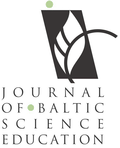PRE-SERVICE SCIENCE AND COMPUTER TEACHERS’ VIEWS ON TEACHING PRACTICE COURSES
| Title | PRE-SERVICE SCIENCE AND COMPUTER TEACHERS’ VIEWS ON TEACHING PRACTICE COURSES |
| Publication Type | Journal Article |
| Year of Publication | 2022 |
| Authors | Bulut, A, Kaban, A, Bilen, Ö |
| Journal | Journal of Baltic Science Education |
| Volume | 21 |
| Issue | 2 |
| Start Page | 179-191 |
| Pagination | Continuous |
| Date Published | April/2022 |
| Type of Article | Original article |
| ISSN | 1648-3898 |
| Other Numbers | E-ISSN 2538-7138 |
| Keywords | computer teaching, pre-service teachers, science teaching, teaching practice course |
| Abstract | The Teaching Practice course taught in Education Faculties gives pre-service teachers real experience before starting the profession. This study aims to examine the teaching practice courses in the undergraduate programs of education faculties by the views of pre-service science and computer teachers. 50 4th grade students, 25 from the science education department and 25 from the computer and instructional technology education department, participated in the study. Within the scope of the study, the data were collected through online interviews of approximately 30 minutes with the participants, and content analysis was made. According to the findings, pre-service teachers believe that teaching practice courses are insufficient to ensure active participation in lessons in terms of learning gains and content and that they lack a flexible structure that allows them to participate in classes at various grade levels. They also stated that the teaching practice course includes result-oriented measurement and evaluation activities. However, they underlined that the semesters and credits allocated to undergraduate teaching practice courses are insufficient. Furthermore, throughout the process, pre-service teachers reported some communication and coordination issues in the teaching practice course. They suggested that every university with an education faculty should open practice schools that include all levels of compulsory education to overcome the challenges encountered during the process. |
| URL | https://oaji.net/articles/2022/987-1652122087.pdf |
| DOI | 10.33225/jbse/22.21.179 |
| Refereed Designation | Refereed |
| Full Text |
